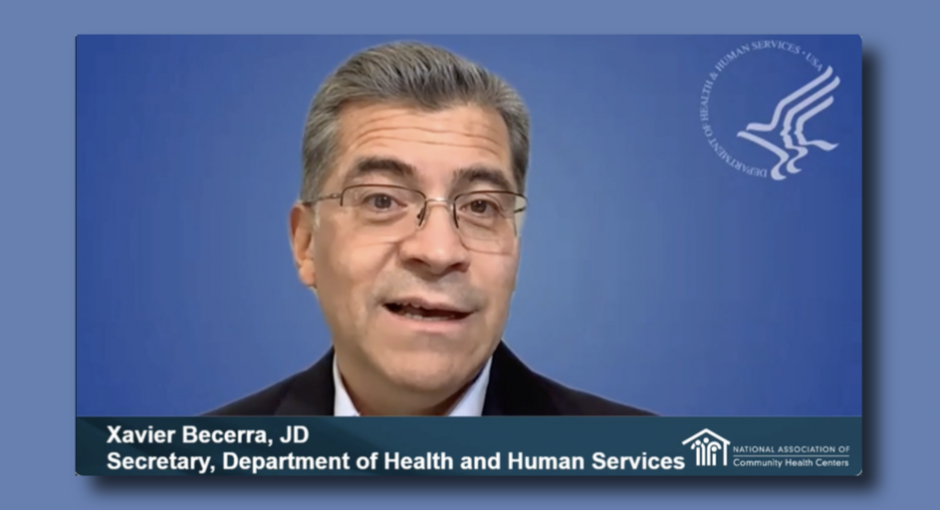U.S. Health and Human Services (HHS) Secretary Xavier Becerra said yesterday that “we’re going to continue to fight” drug manufacturers that restrict 340B pricing when covered entities use contract pharmacies “because it’s the law.”
Becerra’s Feb. 14 remarks about manufacturers’ actions, made at the National Association of Community Health Centers’ (NACHC) 2022 Policy & Issues (P&I) Virtual Forum, came soon after GlaxoSmithKline announced conditions on 340B pricing when hospitals use contract pharmacies to dispense nine of its respiratory medicines. GSK’s new policy exempts health centers and other grantee 340B entities. Eleven of the 14 manufacturers with restrictive 340B contract pharmacy policies target hospitals only.
President Joe Biden pre-recorded brief remarks to NACHC P&I forum attendees. He said health centers are “indispensable in our fight against COVID-19” by “doing what you do best—engage patients with empathy, communicate clearly, build trust, and help them get vaccinated.” Biden did not mention 340B in his remarks as he did on Friday at an event in Culpepper, Va.
Becerra’s Comments
Becerra’s comments about 340B came during a question-and-answer session after he delivered remarks focused mainly on health centers’ response to the COVID-19 pandemic. “Each time I visit a health center, I feel the same: that anyone, rich or poor, young or old, would enjoy walking through the doors of this place,” he said. “Because you feel like you are being treated with dignity and respect, and by professionals that care.”
Kimberly Chen, pharmacy director at North Country HealthCare in Flagstaff, Ariz., asked Becerra what can be done to ensure 340B compliance from pharmaceutical companies.
“Great question because you’re speaking about our critical safety net especially when it comes to prescription medication,” Becerra answered. “340B is a drug discount program, it’s integral to the functioning of many of the community health centers we have throughout the country. Without that it would be very difficult for them to dispense medication to patients.”
“And so, we are going to work really hard,” Becerra continued. “We made our position very clear. We have now had to defend our position in court. I am somewhat limited in what I can say. But if you read the filings we made in court, if you read the statements we have made, or if you simply look at the letters we have written to the drug manufacturers and the rules we have instituted, you can tell we believe in the 340B program, we believe it’s been a success in making affordable prescription medication available to Americans who often times turn to no other place.”
“So, we’re going to continue to fight because it’s the law, at least that’s the way we look at it,” Becerra said. “It’s the law and we’re going to stand up for that and we hope you’ll help us win that battle.”
NACHC earlier this month told Republican members of Congress that “congressional action may be the only solution” to drug makers’ “aggressive actions to limit patients’ access to affordable medications at contract pharmacies.” It said Congress should expand the U.S. Health Resources and Services Administration’s regulatory authority to let HRSA “address issues in ongoing litigation, like the use of contract pharmacies, data collection, and unilateral pricing restrictions.”
Hospital group 340B Health said last month, for the first time, that it is considering advocating for legislation to resolve the 340B contract pharmacy impasse. Not all 340B provider stakeholders are supportive of that approach. AIDS Healthcare Foundation (AHF) said last week that the drug industry “will certainly use any legislation as an opportunity to further undermine” the 340B program.


